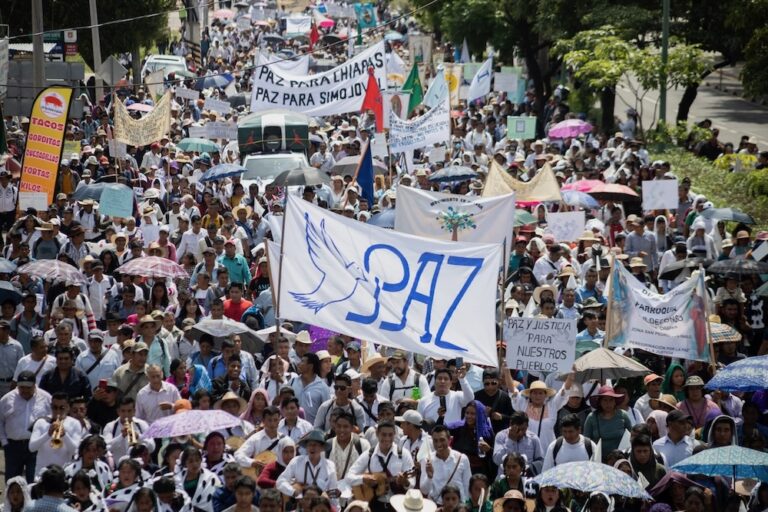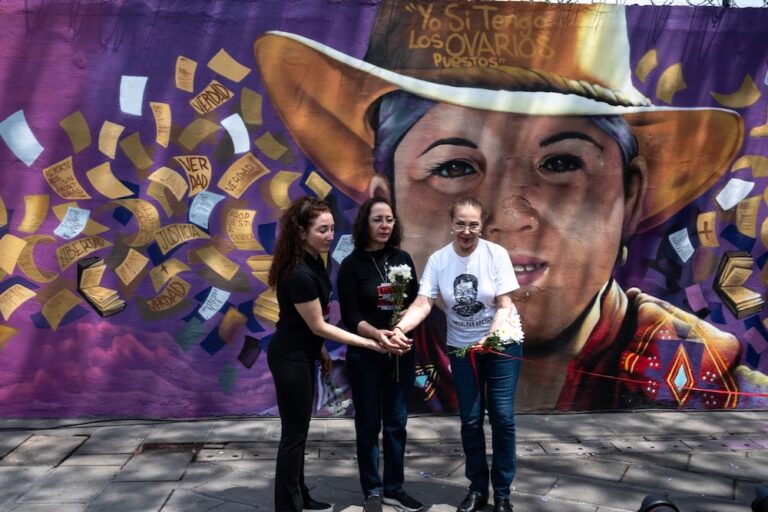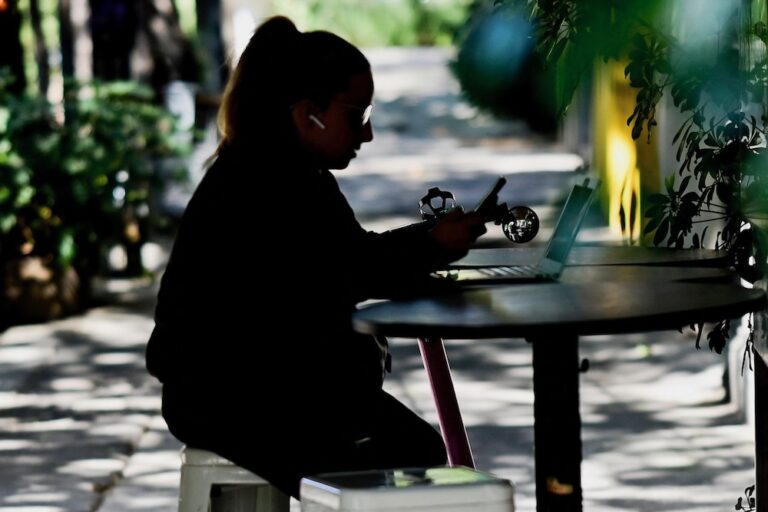(IAPA/IFEX) – The following is a 9 March 2007 IAPA press release: Mexico’s president tells IAPA he will enact decriminalization law passed by Congress MIAMI, Florida (March 9, 2007) – Mexican President Felipe Calderón told a mission of the Inter American Press Association (IAPA) that met with him yesterday at his official residence, Los Pinos, […]
(IAPA/IFEX) – The following is a 9 March 2007 IAPA press release:
Mexico’s president tells IAPA he will enact decriminalization law passed by Congress
MIAMI, Florida (March 9, 2007) – Mexican President Felipe Calderón told a mission of the Inter American Press Association (IAPA) that met with him yesterday at his official residence, Los Pinos, that he will sign into law a measure that decriminalizes libel at the federal level, a measure passed unanimously by the Mexican Senate earlier this week.
“I welcome the decriminalization, and I have chosen to promulgate the law,” Calderón told the IAPA delegation, headed by the hemisphere free press organization’s president, Rafael Molina, adding that “making [libel] a criminal offence is an archaic concept and I have decided to support efforts to increase guarantees for freedom of the press in Mexico.”
The measure, an amendment of Articles 350 to 365 of the Penal Code, was passed by the Senate on a 100-0 vote, with one abstention. It was introduced in the lower house, the Chamber of Deputies, in April last year. It sought to make libel and defamation civil rather than criminal offences, punishable at the federal level by payment of damages.
Although President Calderón indicated that his team would review the text sent by Congress he added, “I have full sympathy with decriminalization and the idea is to go ahead and enact the law.” With this presidential decision the measure would become law once published in the Federal Official Gazette.
Molina, editor of the Santo Domingo, Dominican Republic, newspaper El Día, told Calderón of the IAPA’s pleasure at his decision, declaring, “Mexico is taking some major steps to strengthen press freedom and democracy. Decriminalization enables a legal structure to be built not as a privilege for journalists and news media but as a substantial contribution to the public’s right to information that is, in the end, the most important goal in the process of communication.”
Referring to an earlier conversation with lawmakers, Molina told Calderón that there was a need for the decriminalization to be raised to a constitutional level so that it would apply in all of the states in Mexico.
Calderón also said that he “sympathized with the idea of stiffening penalties” and other concepts that the IAPA proposed to combat violence being unleashed against journalists and to put an end to impunity, among them the federalization of cases of the murder of journalists and that there be no statute of limitations, and he would review the attributes of the Special Prosecutor’s Office that follows up attacks on journalists “so that its work would be more efficient,” in response to complaints on this issue voiced by the IAPA delegation.
Regarding impunity, Calderón said that he was following “with special interest” the work being done by the IAPA, adding that he also had the hope that “the (Víctor Manuel) Oropeza and (Héctor Félix) Miranda cases are solved and the guilty are brought to justice.”
In this visit to Mexico, which included meetings with representatives of the three branches of the Mexican government, Molina was accompanied by: Edward Seaton, former IAPA president, Seaton Newspapers, Manhattan, Kansas; Juan Franscisco Ealy Ortiz, chairman of the Impunity Committee, El Universal, Mexico City, Mexico; Robert J. Caldwell, chairman of the Press Institute, San Diego-Tribune, San Diego, California; David Adams, regional vice chairman for the United States of the Committee on Freedom of the Press and Information, , St. Petersburg Times, Florida; Roberto Rock, vice chairman of the Impunity Committee, El Universal, Mexico City, Mexico; Héctor Dávalos, Novedades, Acapulco, Mexico, and Ricardo Trotti, IAPA Press Freedom director.
Early in the morning the IAPA delegation met with a group of eight federal legislators from various political parties, taking part in which were, among others, Senate President Manlio Flabio Beltrones and Rep. Gerardo Priego, chairman of the Special Commission for Follow-Up of Attacks on and Threats to Journalists and News Media.
In addition to the agenda topics concerning violence against journalists and impunity the IAPA expressed the need for the new federal reform on decriminalization to be raised to the constitutional level so that it may be adopted by the 32 states in Mexico, given that the majority of libel suits filed against journalists occur in the interior of the country. Currently in only the Federal District (Mexico City) and a small number of states is libel not a criminal offence.
In this regard, Senator Carlos Sotelo García of the PRD party told the IAPA about a bill he was sponsoring to amend the Constitution, a process that could begin shortly and as had already received wide support.
Ealy Ortiz, editor and president of the Mexico City daily newspaper El Universal, on behalf of the IAPA thanked the lawmakers for their readiness to strengthen press freedom, following a two-hour meeting in which the organization raised a list of legal proposals for combating the impunity that surrounds crimes against journalists. “What is necessary is that they have this commitment to press freedom and that we work together so that the good that we may do here in Mexico can be copied in other countries,” Ealy Ortiz said.
The IAPA mission also called on members of both houses of the federal legislature to repeal the 1917 Press Law, which although in disuse maintains some controversial concepts, such as the offence of contempt, which could run counter to full freedom of the press and of expression. The IAPA welcomed the fact that the decriminalization measure has joined other laws such as those on professional confidentiality and access to public information that were enacted recently in Mexico.
The IAPA delegation later met with the assistant prosecutor for human rights in the Attorney General’s Office, Juan de Dios Castro, who announced the appointment, just a few hours earlier, of Octavio Orellana Wiarco as the new special prosecutor for dealing with crimes committed against journalists.
The delegation thanked the Attorney General’s Office for such actions, but declared that ‘it is not much good to have a new institution that has its hands tied, has little budget and works within the Office of the Assistant Prosecutor for Human Rights, which does not allow it to work on crimes against journalists committed by organized crime “a contradiction in terms, given what happens in Mexico.”
Roberto Rock, vice president of El Universal, added that these concerns would be relayed to President Calderón so that other ways could be explored of making the Special Prosecutor’s Office an effective agency for combating violence against journalists.
The IAPA has been noting that the Special Prosecutor’s Office has taken up some cases involving journalists that while important – so far it has 12 such cases under investigation – they are not key in the battle against murders, impunity and the self-censorship that many news media outlets resort to as a consequence of violence unleashed by organized crime, especially along the Mexico-United States border, the main obstacle currently to being able to work as a journalist.
In a meeting with Supreme Court Chief Justice Guillermo Ortiz Mayagoitia, the IAPA delegation expressed concern at the murder of 56 journalists in the last two decades, the escalation of violence and the failure to solve such crimes.
The judiciary was offered detailed information gathered during investigations by the IAPA into a number of cases, among them those that the organization was dealing with through the Inter-American Commission on Human Rights.
The IAPA expressed gratitude for the transparency shown by the judiciary in recent years following a commitment made within the framework of a conference held by the organization in 2004 with the justices of the various states’ Supreme Courts. Supreme Court sessions are now broadcast live on television.
Finally, Molina confirmed an invitation to Ortiz Mayagoitia to take part in the Hemisphere Conference on The Judiciary, The Press and Impunity that the IAPA will be holding, as part of its Anti-Impunity Campaign, in Santo Domingo, Dominican Republic, July 18-20.
The IAPA delegation also met with Héctor Fix Fierro, president of the Legal Research Institute at the National Autonomous University of Mexico, with whom it discussed constitutional and criminal law issues and that of impunity.
The results of the mission to Mexico, like that made to Paraguay 10 days ago, will be the subject of discussion during the IAPA’s Midyear Meeting, to be held in Cartagena, Colombia, beginning on March 16.


